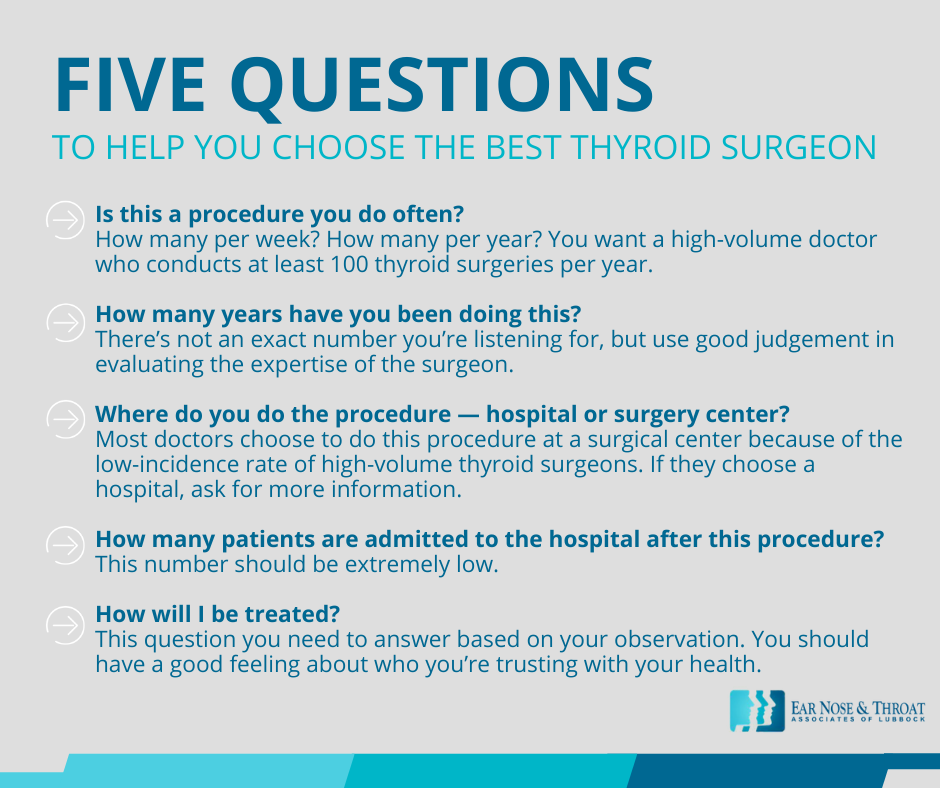5 Things You Should Know When Choosing a Thyroid Surgeon

When it comes to thyroid surgeon, how do you know you’re in good hands? Most people choose because they were given a trusted reference. They found their thyroid surgeon via a friend who had a successful surgery and recommended the surgeon. Or, they were referred from their endocrinologist, primary care doctor, or internist.
When patients come in, they’ve usually done their homework and asked another doctor about our credentials. Plus, they know their referring doctor doesn’t want to make a bad recommendation.
Yet even with the trusted advice of other doctors or friends, patients should investigate the validity of their recommended surgeon for themselves. When it comes to choosing a thyroid surgeon, questions regarding their reputation, track record, number of surgeries, and frequency of complications are extremely valid.
5 Questions to Help You Choose the Best Thyroid Surgeon
Here’s what you should ask to make the most informed decision regarding your upcoming thyroid surgery.
1. Is this a procedure you do often? How many per week? How many per year?
You want a high-volume doctor who conducts at least 50 thyroid surgeries per year.
2. How many years have you been doing this?
There’s not an exact number you’re listening for, but use good judgement in evaluating the expertise of the surgeon. Do they seem to be a person with CANEI (constant and never ending improvement)? Choose a surgeon who strives to be the best.
3. Where do you do the procedure — hospital or surgery center? If you don’t do it at the surgical center, is there a particular reason?
Most doctors choose to do this procedure at a surgical center because of the low-incidence rate of complications with high-volume thyroid surgeons. If they choose a hospital, ask for more information.
4. How many patients are admitted to the hospital after this procedure?
This number should be extremely low.
5. How will I be treated?
This question you need to answer based on your observations. Look at the staff and office to evaluate:
- Is the staff helpful?
- How are you treated?
- Is the equipment updated?
- Is the facility clean?
- Are they following strict COVID protocols?
The office should look like it runs well — and you should have a good feeling about who you’re trusting with your health.

Possible Complications and Side Effects
With the right surgeon, complications are extremely rare. In fact, a high-volume thyroid surgeon should have no more than a 1% rate of vocal cord paralysis. In order to avoid this complication, the surgeon must correctly identify the recurrent laryngeal nerve (RLN) and avoid injuring it during the procedure. Otherwise, complications can be severe. The patient could experience severe hoarseness, difficulty swallowing, or even complete vocal cord paralysis. If the damage is permanent, you may need additional surgeries.
Parathyroid complications should also be avoided. Injury to healthy parathyroid glands result in a decrease in calcium and permanent calcium deficiency.
Bleeding problems are extremely rare after a thyroidectomy. It’s highly unlikely a patient will need to return to surgery for a bleeding problem.
Infection is also very rare. Patients are given an oral antibiotic before the procedure, but none following the procedure.
Underlying health problems are complications that can’t necessarily be avoided. Patients should always inform the surgeon about pre-existing heart or lung issues. Thyroid surgery is often necessary despite other health problems, but we want to make sure we take precautions to minimize risk. For patients with preexisting conditions, we may elect to conduct the procedure in a hospital with an overnight stay. But even with these patients, the vast majority can go home the next day.
Why Choosing the Right Surgeon Matters
When you choose the right surgeon, you reduce your chance of complications significantly. You want your surgeon to be experienced enough to avoid any injury to the RLN and healthy glands, keeping you as safe as possible.
Dr. Scolaro is a board-certified Otolaryngologist servicing the South Plains area. He has been practicing in Lubbock since 1990 and has earned a reputation as a skilled and experienced surgeon. He currently serves as the Medical Director for Covenant High Plains Surgery Center campuses, is a member of Covenant Health Partners and is an adjunct faculty professor for Texas Tech University Health Sciences Center School of Medicine. Learn more about Dr. Scolaro.
Categories:








